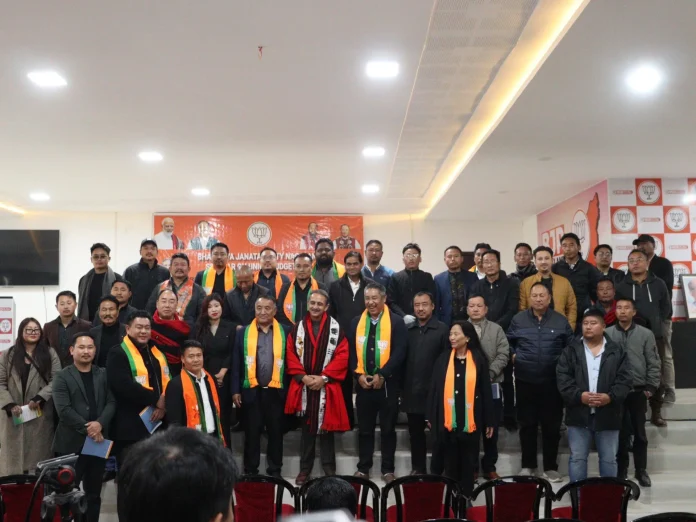DIMAPUR, Feb 19: Union Minister of State for Environment, Forest & Climate Change and External Affairs, Kirti Vardhan Singh, discussed the Union Budget for 2025 during a press conference held at Nagaland’s State BJP Headquarters. He emphasized the Centre’s unwavering commitment to the advancement of the North East region and its importance in India’s growth.
Singh noted that India remains the fastest-growing economy globally, and the Union Budget reflects the government’s vision of a “Viksit Bharat” (Developed India) and “Atma Nirbhar Bharat” (Self-Reliant India) by 2047. The government is focused on incorporating the North East into the national development framework.
Singh explained that the reduced railway services from Dimapur were due to the development of new rail routes in the region, with trains now originating from various other stations. The increase in highway infrastructure and improved regional connectivity also contributed to the decline in railway traffic. Singh assured that this issue would be addressed in future railway reforms.
Praising the UDAN Regional Connectivity Scheme, Singh highlighted the establishment of new airports and the upgrading of stations, making travel more accessible to and from the North East. The current budget includes funding for the construction of 50 new airports in the region as part of a larger initiative to open 120 new destinations nationwide.
On the long-delayed Chiethu greenfield airport project in Kohima, Singh promised to investigate the matter and provide further information, acknowledging that airport development depends on factors such as land availability, infrastructure, and feasibility.
The Union Budget also prioritizes boosting farmers’ incomes, supporting small and medium enterprises, enhancing defense production, generating employment, and empowering women and tribal communities. Singh highlighted significant tax reforms aimed at improving ease of doing business, expanding universal healthcare, and improving national connectivity through investments in roads, highways, railways, and air travel.
Singh commended the Ministry of Development of North Eastern Region (DoNER) for its substantial efforts in ensuring dedicated funding and overseeing the region’s development. He stressed the importance of having a separate ministry dedicated to the North East, a unique feature not found in other parts of India.
Discussing the Act East Policy, Singh clarified that it focuses on enhancing diplomatic and infrastructure ties with neighboring countries, but is not exclusively aimed at the North East. He highlighted the region’s economic potential, especially in eco-tourism, which could provide substantial income for local communities.
Singh also pointed out that digital connectivity has helped bridge the divide between the North East and the rest of India. He confirmed that internet access would be extended to villages, panchayats, and schools, further advancing sectors like education and healthcare through information technology, which remains a top priority for the Centre.
Singh reaffirmed the government’s dedication to the comprehensive development of the North East, assuring that efforts would continue to ensure inclusive growth, enhanced connectivity, and ongoing infrastructural progress in the region. He also promised to address the concerns raised during the press conference with the relevant ministers and authorities.

